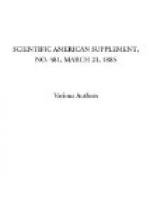There remains the question already alluded to as inextricably bound up with American labor problems: How does the American tariff affect wages? The idea that these are determinable by the tariff is the corner stone of protection in the States. The artisan has been so sedulously educated to believe that the chief object of import duties is to protect him from falling into a ruinous competition with what is called the “pauper labor of Europe,” that no movement on the part of workmen in the direction of free trade is ever likely to arise in America. I am not now about to argue the question of protection, except in so far as it relates to labor; but it may be remarked, in passing, that internal competition, rather than the people, is the enemy from whom the tariff will probably receive its death blow in the future. Protection will ultimately break down by its own weight in the States. Production already exceeds demand, the cry for a “wider market” and for “raw materials free” is in every manufacturer’s mouth; and if America upholds her protective legislation too long, the produce of her factories and mills will, by and by, force its way, in spite of the tariff, into the open markets of the world, but it will be through the gate of national suffering. Few people in this country are, I think, aware of the extraordinary fervor with which the doctrine that protection benefits labor is preached in the States. We are ourselves accustomed to hear the question of free trade argued only from the economic standpoint, but this is by no means so commonly the case in America. I shall try, by paraphrasing certain recent addresses of an able personal friend and enthusiastic protectionist, to illustrate the position taken by those persons who advocate the tariff, not upon economic grounds, but in the avowed interests of labor.
Referring to the words “Free Trade,” the speaker in question begins by asking, “What is the essential nature of that which we call trade?” And answers himself as follows:
“The grim, ugly fact is that trade is a fight, the markets are battle fields, the traders are gladiators, carrying on a true war around questions of values, with no care whether the opposing party or the community at large can afford that the trade is made. This contest is always going on, whether a lady buys a pair of gloves, or a syndicate corners Erie. Antagonism is so fixed an element of trade, and so often defeats the object it blindly follows, as to make laws which seek to mitigate the ferocity of the struggle as welcome to the far-sighted man of business as they are to the foredoomed victims of this relentless warfare.”
On the other hand, competition is said to be a—




